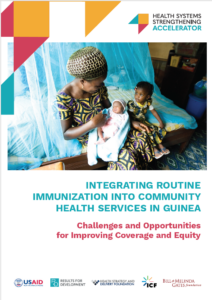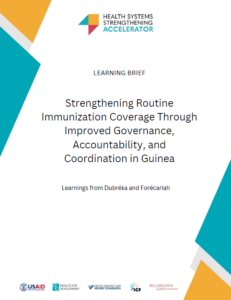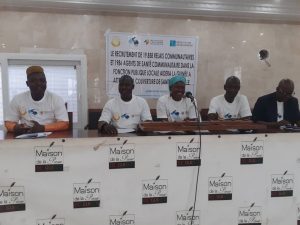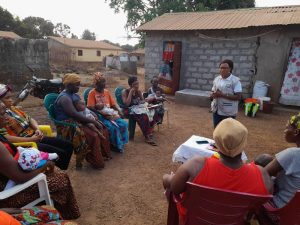Locally Led Approaches to Strengthen Immunization
The Accelerator is actively enhancing routine immunization coverage, focusing on overcoming systemic challenges to meet the goals of WHO’s Immunization Agenda 2030 and Gavi 5.0. In Guinea, our efforts include integrating immunization into the National Community Health Policy, tackling funding and resource barriers, strengthening leadership and engagement of local elected officials and CSOs in promoting immunization, and maximizing the use of community health workers to deliver equitable immunization services to children. In Togo, we align immunization efforts with the Universal Health Coverage strategy, ensure sustained immunization resources across all life stages, and emphasize equity. In Mauritania, the Accelerator focuses on data-driven solutions, community-specific demand creation, and direct engagement with underserved communities to increase vaccine distribution and acceptance. Additionally, the Accelerator’s analyses and learning activities around effective strategies for leveraging immunization campaigns for routine immunization and sustainably implementing COVID-19 vaccination in the post-emergency response phase of the pandemic have supported countries to identify pragmatic, local strategies for strengthening health systems to protect vulnerable populations and promote resiliency during emergencies.
The Accelerator facilitated a virtual dialogue between key stakeholders from Guinea and Togo to discuss strengths and weaknesses within their countries’ immunization and community health systems and how these two systems can be further integrated. Learn more
Representatives from Bahrain, Bangladesh, and Kenya spoke on a panel moderated by Professor Samba Sow about vaccine rollouts in their respective countries and their countries’ challenges. Their concerns centered on coordinating the procurement, stocking, and distribution of vaccines. Learn more
This systematic literature review synthesizes key learnings and identifies gaps in evidence that would support practical approaches for more holistic country-level planning among routine immunization, campaigns, and other immunization service delivery modalities to achieve immunization goals. Learn more
The Accelerator conducted a systematic review to find evidence on priority themes, focusing on synthesizing lessons on the practical opportunities and challenges in leveraging campaign and campaign outputs to strengthen RI systems. Learn more
COVID-19
Ongoing efforts are underway to enhance COVID-19 vaccination outreach and integration within broader health systems in various countries. As the world transitions from the emergency phase of the pandemic—with a notable declaration from WHO in May 2023 marking the end—low- and middle-income countries face significant challenges, including underwhelming vaccination rates, with only 26% of individuals in low-income areas fully vaccinated. Through detailed assessments conducted in several countries, including Ethiopia, Nigeria, Togo, Benin, Ghana, India, Kenya, Liberia, and Mozambique, the assessments and activities revealed several systemic issues affecting vaccination efforts, such as logistical challenges, funding bottlenecks, human resource fragmentation, and widespread misinformation. These findings helped pinpoint effective strategies and recognize the crucial role of inclusive planning and community involvement in increasing vaccine uptake for priority populations.
This collaborative and multifaceted approach aimed to sustainably improve COVID-19 vaccination coverage for priority populations and strengthen health systems’ resilience and responsiveness to better prepare for future health emergencies. This initiative was part of a broader effort to understand and address the challenges faced during the post-emergency phase of the COVID-19 pandemic.
GUINEA
The Accelerator is dedicated to transforming Guinea’s immunization landscape. Guinea’s routine immunization (RI) coverage has remained stagnant at very low levels. Most recent data (2022) shows that only 47% of children received three doses of the diphtheria-tetanus-pertussis (DTP) vaccine, and 38% of children were “zero-dose.” Guinea’s low RI coverage is also attributable to low rates of domestic funding disbursements and heavy reliance on external funds.
To address these challenges, the Accelerator has focused on several key areas: enhancing financial resources and coordination and increasing community engagement. Workshops in Télimélé, Boffa, and Forécariah have empowered local officials and community leaders to identify funding needs and advocate for more robust financial support, leading to substantial local contributions.
A new coordination committee between Guinea’s EPI, the National Community Health Directorate, and the National Health Promotion Service is improving integration and oversight of community health workers and routine immunization efforts. Additionally, the Accelerator supports intense social mobilization campaigns in Dubréka and Forécariah, involving local elected officials, CSOs, and religious leaders providing community education and awareness raising to enhance vaccine acceptance. These comprehensive efforts aim to rebuild trust in vaccines and establish a resilient, community-supported immunization system in Guinea.
Notice: Trying to access array offset on value of type bool in /home/acceleratehss/public_html/wp-content/plugins/elementor/includes/base/widget-base.php on line 223
Notice: Undefined offset: -1 in /home/acceleratehss/public_html/wp-content/plugins/elementor/includes/base/controls-stack.php on line 695
Above: Community-based organizations are key in identifying kids who have missed their vaccine doses via education and social mobilization. In Guinea, Civil Society Organizations, supported by the Accelerator, hold educational dialogues promoting routine immunization and #immunization of children missing part of their vaccine series in Dubréka and Forécariah. Photo credit: The Accelerator
TOGO
In Togo, the challenge of maintaining immunization coverage beyond the first year of life is significant. Only 49% of children aged 12-23 months are fully immunized, and just 67% receive the second dose of the measles vaccine. This low coverage is due to systemic issues such as funding shortages, supply chain disruptions, fragmented human resources, and practical barriers like poverty and the distance to healthcare facilities.
Recognizing these vulnerabilities, especially the heavy reliance on external financing and data quality challenges, particularly for the measles vaccine, the Accelerator’s support focused on enhancing financial management, improving data handling, and integrating immunization with broader health services. Initiatives include training for district-level EPI focal points on data management and extending community health workers’ roles to include a broader range of services, thereby increasing community engagement and trust in immunization programs. These efforts are part of a broader strategy to strengthen routine immunization by leveraging national resources and cross-country experiences to build resilient health systems.
RESOURCE
MAURITANIA
COVID-19 vaccination rates remain low in Mauritania, with only 42.4% of the population receiving at least one vaccine dose and just 30% completing the series; routine immunization for children under five is also suboptimal, with only 76% of children having received their DTP3 dose according to the most recent data. Vaccine hesitancy is compounded by limited healthcare access, demographic disparities, and a profound distrust in the healthcare system, highlighting a critical need for robust public health initiatives.
The Accelerator works with partners and collaborates with the government and civil society to enhance Mauritania’s vaccination strategy. By focusing on data-driven solutions, community-specific demand creation, and direct engagement with underserved communities, the Accelerator is paving the way for a strategic overhaul of vaccine distribution and acceptance. This comprehensive approach not only aims to mitigate hesitancy but also reinforces trust and increases vaccine uptake across the country, setting a new standard in health system resilience and supporting the integration of COVID-19 vaccination into the country’s routine immunization system.








